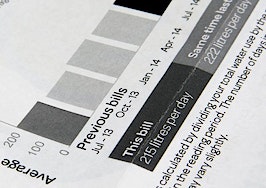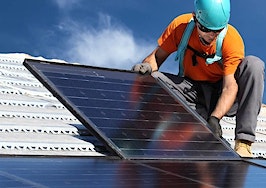- UtilityScore is recommending home improvements that will cut down on utility costs, estimating the savings that will result from those improvements and showing loan options for financing the projects.
- UtilityScore's scores -- which rate a home's utility costs on a scale of 1 through 100 -- are now appearing on HotPads, a rental site operated by Zillow.
Consumers who snag homes that look like bargains sometimes make an unpleasant discovery: High gas, electric and water bills that bite into any savings on property price.
UtilityScore previously rolled out scores to help consumers avoid these rude surprises.
Now UtilityScore — which was created by energy consulting firm BKi and is backed by the startup accelerator Y Combinator — is offering insight into how to improve those scores, recommending home improvements that will cut down on utility costs as well as loan options for financing the projects.
UtilityScores also are receiving airtime on HotPads, a rental site operated by Zillow Group. HotPads has slapped the scores onto some listings, with the aim of giving renters a “truer picture of what the costs are to live in their next home,” said HotPads General Manager Douglas Pope said in a statement.
Myutilityscore.com
Enter an address into myutilityscore.com and the site will now show estimated savings for projects covering solar power, heating and cooling, plumbing fixtures, appliances, water heating and windows.
It also presents financing options from several lenders for every project, driving potential referrals to the lenders by linking to their websites.
The solar panel recommendation for a search of a property in Connecticut claims yearly savings of $1,062 and lifetime savings of $21,231.
Under “top financing options” — which presumably represent loans that are equal in size to the installation cost of solar panels for the home — UtilityScore displays a seven-year $325-a-month loan from SoFi, five-year $490-a-month loan from FreedomPlus and three-year $590- a-month loan from Earnest.

A UtilityScore home improvement recommendation for a Connecticut property.
How do the scores measure up?
Like so many online estimates, UtilityScore’s savings estimates require a leap of faith from users and are short on context.
They display “yearly” and “lifetime” figures for projects with no explanation of how the figures are calculated, and their savings estimates don’t include the length of time it will take for a project to generate a positive return on investment (when the amount of savings on energy bills resulting from an improvement will surpass the cost of the improvement).
The site does recognize some variables that may impact savings by recalculating estimates if users specify conditions relevant to a project, such as by indicating current heater type and when heating ducts were last replaced under the electric heat pump heater recommendation.
HotPads is the latest property search site to tap UtilityScore’s API (application programming interface) to display UtilityScores, joining the public search site of REColorado, Colorado’s largest multiple listing services (MLS) and the websites of a number of brokerages and agents.

Screen shot shows UtilityScore of listing on HotPads.
The scores appear beneath the “Surrounding Area Stats” section on some HotPads listings.
UtilityScore estimates that appeared on some apartment listings on Friday seemed to show cost estimates for the listings’ entire apartment buildings, rather than the individual listings themselves.
UtilityScore spokesman Brian Gitt said HotPads had fixed the issue on Thursday, though HotPads appears to have scaled back the number of listings displaying UtilityScores since then.
Utility costs account for 25 percent of monthly housing expenses, UtilityScores says, citing Census Bureau figures. And their size varies widely based on a range of factors, including location and home type.
UtilityScores rate the utility costs of homes on a scale of 1 to 100, with 100 representing the lowest utility costs compared to other homes in the area and 1 the highest.
The scores also provide cost estimates on monthly electricity, gas, and water and sewer bills. The scores can show which of two identically priced properties is actually the most expensive.













